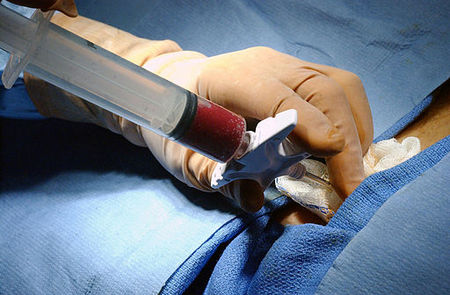



A Day in the Life
Medical oncologists are specifically concerned with the systemic treatment of cancer - cytotoxic agents, hormonal agents. There is the opportunity to further specialize in the treatment of specific disease sites. There are many opportunities to be involved in research and knowledge translation and many medical oncologists will pursue graduate work related to research.
Medical oncologists develop relationships with their patients over time and have expertise in diagnosis, treatment and palliation of malignancies.
Most medical oncologists in Canada practice in an academic settings although there are a few community oncologists.
Patient Care
Academic oncologists spend 40 to 70% of their time seeing patients, mostly in outpatient settings. Most academic oncologists are in clinic three times a week.
Patients are seen:
as outpatient consultations - usually new patients who have just been diagnosed with cancer
as inpatient consults - patients admitted under other services who have a newly diagnosed or known cancer and require the expert opinion of a medical oncologist
for treatment - mostly patients who are actively undergoing treatment with chemotherapy or targeted agents or who need active symptom management
for follow-up - usually patients who have completed their chemotherapy treatment or who are not on active treatment for some reason or another
in hospital - either when the medical oncologist is the attending on an oncology service or concurrently with an attending from another service
acutely in the chemotherapy room if the patient sis having a reactions or other problems that need the attention of the physician
Education
Most oncologists are actively involved with teaching medical students and residents. Oncology clinics are popular with medical students and residents; the willingness of patients with a vast variety of malignant diseases, and the associated symptoms and signs make for a rich learning experience.
Oncologists are also involved in the ongoing education of other health care providers in the hospital and the community.
Specialization and Collegial work
There has been a trend, even in community oncology practices, for physicians to specialize in one or two types of tumours e.g. GI and melanoma or other combinations. This is a reflection of the rapid progress that has been made in the last twenty years in the field of oncology and the number of treatment options available for our patients.
Oncologists usually participate in weekly, biweekly or monthly tumour boards where patient cases are discussed in a multidisciplinary fashion with surgeons, radiologists, and radiation oncologists.
Research
Oncologists involved in research can either conduct clinical trial research, translational research (where molecular or laboratory research is directly linked to clinical questions), or basic research.
Administration
Many oncologists participate in administrative, policy or quality assurance work because of the complexity of the care currently provided for cancer patients and the societal and economic burdens of cancer.
Training
Medical oncology is a sub-specialty of internal medicine and requires at least:
3 years Internal Medicine residency
2 years specialty training
Medical oncologists enter sub-specialty training after completing internal medicine training. Their training usually is two years but some oncology fellows pursuer further training usually in the form of fellowship which could be clinical such as further specialization in one type of tumour, or research fellowship such as learning about how to conduct clinical trials or a combination of the two.

 Previous
Previous